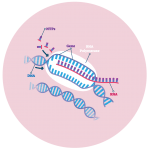Folate also known as Vitamin B9 plays an essential role in several key bodily functions. Adequate dietary consumption or supplementation can help prevent anemia, protect against birth defects, and promote overall health and well-being.
What does Folate do?- Feed Me!

Utilization

REPRODUCTIVE HEALTH
Crucial during periods of rapid growth and pregnancy. Helps regulate embryonic and fetal nerve cell formation Reduce the risk of birth defects of the brain and spine by taking folic acid regularly and maintaining a healthy pregnancy. Pregnant women should take at least 400-800 micrograms of folic acid daily before and during the first trimester.

CELL
Folic acid, also known as vitamin B9, is a crucial nutrient that plays a vital role in the development and maintenance of healthy cells in the body. It helps to produce and maintain new cells, including red blood cells, and supports the production of DNA and RNA, the genetic material that forms the basis of all life. Making it especially important during pregnancy and for overall health.

DNA & RNA
Folate is a vital nutrient involved in DNA and RNA synthesis by acting as a coenzyme. Its deficiency may cause anemia and neural tube defects.

MENTAL HEALTH
Folate helps regulate the production of neurotransmitters, such as serotonin, that affect mood.
Too Much And Not Enough

INSOMNIA
Research shows that a deficiency in Vitamin B9 can lead to a decrease in serotonin and dopamine levels, chemicals that regulate mood and sleep. This can result in symptoms such as fatigue and insomnia.

GREY HAIR
Recent research suggests that deficiencies in folate may lead to premature graying of hair. A B9 deficiency can also cause other iron-related problems that can lead to hair loss and thinning,

DIGESTIVE ISSUES
One of the most common issues associated with folic acid is nausea. This can be caused by taking high doses of vitamin B9, which can be commonly found in supplements. Additionally, individuals with digestive conditions that affect the gastrointestinal tract, such as inflammatory bowel disease (IBD), may have difficulty absorbing folic acid properly

HEART DISEASE
Studies have shown that low levels of folate in the blood can increase the risk of heart disease, stroke, and other cardiovascular problems. This is because folate helps to lower levels of homocysteine in the blood, which is an amino acid that can damage arteries and increase the risk of heart disease.

ANEMIA
Folate-deficiency anemia is a serious medical condition that occurs when there is a lack of folic acid in the blood. Folic acid is an essential nutrient that our bodies need to produce healthy red blood cells and to function properly. When we do not consume enough folic acid, our bodies cannot produce enough red blood cells, causing anemia.

